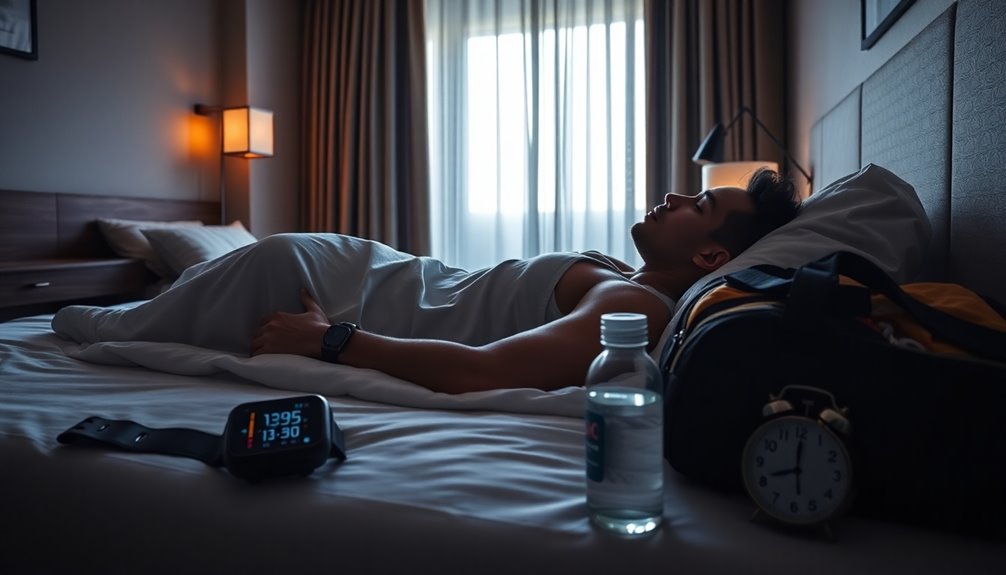Sleep's essential for your recovery and athletic performance. It helps repair muscles, boosts energy, and enhances cognitive functions like memory and decision-making. When you get enough quality sleep, you improve reaction times and overall performance. However, lacking sleep can drastically decrease your accuracy and increase feelings of irritability. Prioritizing sleep not only protects your mental state but also sharpens your focus. Discover more about how sleep directly impacts your game and recovery techniques.
Key Takeaways
- Sleep facilitates muscle repair and energy replenishment, essential for athletic recovery and performance enhancement.
- Quality sleep improves cognitive functions like memory and decision-making, critical for sports success.
- Consistent sleep routines help maintain energy levels and emotional health, directly influencing performance.
- Sleep deprivation can drastically reduce accuracy and reaction times, leading to poorer athletic outcomes.
- Prioritizing sleep aids in hormone regulation and lowers injury risk, maximizing overall athletic potential.
Why Is Sleep Important For Athletes?

Why is sleep so essential for athletes?
Sleep acts as an important recovery strategy, allowing your body to repair muscle cells and replenish energy stores. During deep sleep, your body releases growth hormone, which promotes muscle healing and growth.
If you're sleep-deprived, you can see a staggering 50% decrease in accuracy during performance tasks and up to 60% drop in athletic performance.
Quality sleep isn't just about physical recovery; it greatly enhances cognitive functions like memory retention and decision-making, critical for executing skills during competitions. Additionally, a consistent sleep routine can help in protecting energy and maintaining emotional health, which are vital for athletic performance.
Maintaining a consistent sleep routine and good sleep hygiene can help improve your sleep quality, ultimately boosting your athletic performance and helping you recover effectively.
Prioritize your sleep for the best outcomes on the field.
How Sleep Helps an Athlete's Mental State

Sleep not only supports physical recovery but also plays an essential role in an athlete's mental state.
Quality sleep enhances memory retention and skill acquisition, enabling you to learn and execute techniques effectively. When you face sleep deprivation, cognitive decline can occur, harming your decision-making and adaptability in high-pressure situations.
Adequate sleep leads to improved mood regulation, reducing irritability and enhancing your overall mental health, which is critical for consistent performance. Athletes who prioritize improved sleep quality report higher motivation and focus, vital for training and competition readiness.
Additionally, insufficient sleep can greatly drop your reaction times and accuracy, with performance differences of up to 50%.
Prioritizing sleep is key to maintaining your mental edge in sports.
How Does Sleep Affect Athletic Performance?

When athletes get enough quality rest, they release significant enhancements in their performance. Adequate sleep improves reaction times, sprinting speed, and shooting accuracy, which can lead to remarkable gains in athletic performance.
For instance, studies show that basketball and tennis players experience notable improvements after extended sleep. Conversely, sleep deprivation can result in a dramatic drop in accuracy, emphasizing how sleep quality is fundamental for maintaining precision. Just one additional hour of sleep can yield up to a 60% difference in performance.
Quality sleep also bolsters cognitive functions essential for sports, enhancing memory retention and decision-making, ultimately aiding recovery and reducing injury risks.
Prioritizing sleep is critical for maximizing your athletic potential.
A Lack of Sleep Affects an Athlete's Performance

Lack of sleep can drastically undermine an athlete's performance, turning potential victories into missed opportunities. When you don't get enough rest, your training session suffers, leading to a 50% drop in accuracy.
This poor sleep impacts your mood and lowers peak cognitive function, hindering decision-making on the field. It also reduces sprinting performance and cardiorespiratory endurance, making every effort feel more challenging.
Chronic lack of sleep raises injury rates, as exhaustion and decreased mental clarity increase the risk of accidents. Additionally, poor sleep quality can lower testosterone levels and elevate cortisol, impairing muscle recovery.
To maximize your potential and enhance performance, prioritize sleep as a crucial component of your training regimen.
Stages of Sleep for Athletes

Understanding the stages of sleep is essential for your recovery and performance as an athlete.
Each phase, from light sleep to deep sleep, plays a unique role in muscle repair and memory consolidation.
Sleep Cycle Phases
As athletes aim for peak performance, recognizing the significance of the sleep cycle phases becomes essential. The sleep cycle consists of four stages: three NREM sleep stages and one REM sleep stage.
Stage 1 NREM sleep is a brief shift phase, leading you into deeper sleep. Stage 2 NREM sleep, which occupies about 50% of your sleep time, is critical for memory consolidation, enhancing your athletic performance.
In Stage 3 NREM sleep, or deep sleep, your body focuses on tissue repair and muscle recovery through the release of growth hormone.
Finally, REM sleep occurs after about 90 minutes, supporting emotional regulation and mental clarity, both important for maintaining focus during competitions.
Prioritizing the quality and quantity of these sleep phases is key for recovery.
Deep Sleep Benefits
Deep sleep plays an essential role in your recovery and overall performance as an athlete. This stage enhances muscle growth, cognitive function, and hormonal balance, ensuring you recover effectively after intense training. Check out the benefits of deep sleep below:
| Benefit | Explanation |
|---|---|
| Muscle Growth | Releases growth hormone for tissue repair |
| Cognitive Function | Improves memory consolidation and skill acquisition |
| Glycogen Restoration | Restores energy reserves for workouts |
| Hormonal Balance | Reduces cortisol, supporting muscle recovery |
| Sleep Quality | Elevates overall performance |
Prioritizing deep sleep not only boosts your recovery but also enhances your performance on the field, making it vital for any dedicated athlete. Additionally, maintaining clean air quality in your sleeping environment can further improve sleep quality and recovery.
Sleep Hygiene Tips for Athletes

To maximize your athletic performance and recovery, it's essential to prioritize sleep hygiene. Start by maintaining a consistent sleep schedule, going to bed and waking up at the same time daily. This helps regulate your internal clock and improves sleep quality.
Create a sleep-friendly environment by keeping your bedroom dark, quiet, and cool to enhance deep sleep. Limit screen time and blue light exposure at least an hour before bedtime, as it disrupts melatonin production.
Incorporate relaxation techniques like deep breathing or meditation to lower stress and ease into sleep. Finally, avoid heavy meals, caffeine, and alcohol close to bedtime, as they can disrupt your sleep patterns and impair your body's recovery processes. Additionally, consider implementing gentle stretching before bedtime to relax muscles and promote a more restful sleep.
Jet Lag in Athletes

When athletes travel across multiple time zones, they often face the challenge of jet lag, which can greatly disrupt their performance and recovery. This disruption occurs when the body's circadian rhythm is thrown off, leading to fatigue and decreased performance.
To combat jet lag, you should adjust your sleep schedule to match the destination's time zone before travel. Staying hydrated and aligning your meal times with the local schedule are also effective strategies.
Creating a dark and quiet sleep environment during flights can improve rest, aiding quicker adaptation. Research shows that managing jet lag well results in better mood, reaction times, and overall performance, making it vital for athletes to prioritize these strategies during travel. Additionally, incorporating intelligent tutoring systems can help athletes develop personalized strategies for managing their sleep and recovery effectively.
The Connection Between Sleep and Recovery

While you might focus on training intensity and nutrition, don't underestimate the essential role sleep plays in your recovery.
Quality sleep is crucial for athletes, directly impacting performance and muscle growth. Here are three key benefits of prioritizing sleep:
- Hormone Regulation: Adequate sleep boosts growth hormone release, aiding muscle repair and tissue regeneration.
- Enhanced Performance: Athletes reporting longer sleep duration see improvements in sprinting speed and reaction times, highlighting the link between sleep quality and recovery.
- Cognitive Function: Sleep helps your brain remove metabolic waste, improving decision-making and focus during high-stakes situations.
Frequently Asked Questions
Why Is Sleep Important During Recovery?
Sleep's essential for your recovery because it's when your body repairs itself.
During deep sleep, growth hormone kicks in, helping to heal muscles and rebuild tissue.
If you skimp on sleep, you might find your performance slipping. You won't just feel fatigued; your muscle recovery slows down, and your cognitive function can take a hit.
Prioritizing quality sleep means you're setting yourself up for better workouts and improved overall performance.
Why Is Sleep so Important for Healing?
Sleep's essential for healing because it's when your body performs its most critical repair processes.
During deep sleep, human growth hormone gets released, promoting muscle repair and tissue regeneration.
If you don't get enough rest, catabolic hormones like cortisol can rise, making recovery harder.
Plus, sleep helps clear metabolic waste from your brain and muscles, enhancing your overall health.
Prioritizing quality sleep is important to guarantee you're healing effectively and staying strong.
What Is the Importance of Sleep in Performance?
Sleep's essential for your performance, as it directly affects your cognitive function and physical abilities.
When you're well-rested, you're sharper, more focused, and able to make quicker decisions. You'll notice better coordination and increased endurance during workouts.
Lack of sleep, on the other hand, can lead to decreased accuracy and slower reflexes, which could hinder your training and increase your risk of injuries.
How Does Sleep Affect Body Recovery?
Did you know that athletes who boost their sleep by just one hour can see a 20% improvement in performance metrics?
When you sleep, your body goes into repair mode, fixing muscles and replenishing energy stores. This restoration helps you recover from workouts faster, enhances your strength, and keeps you sharp mentally.
If you're skimping on sleep, you're not just tired; you're also hindering your body's ability to recover and perform at its best.
Conclusion
In the grand symphony of athletic performance, sleep is the silent conductor, orchestrating recovery and mental clarity. Just like a well-tuned instrument, your body needs those restorative hours to play its best. Neglecting sleep is like missing a vital note, throwing off the entire melody. By prioritizing rest, you’ll not only enhance your performance but also harmonize your mind and body for the challenges ahead. So, embrace the night and let your dreams fuel your journey to greatness. Recognizing the signs you need a rest day is essential in this pursuit; fatigue, irritability, and decreased motivation can all indicate that your body is asking for a breather. By listening to these signals, you can prevent burnout and maintain your edge in competition. Remember, even the most skilled athletes take time to recharge, ensuring they return stronger and more focused for what lies ahead.









